The Israel-Hamas war tears at Teaneck's inclusive tradition. Can it be fixed? | Kelly
Editor's note: Columnist Mike Kelly has lived in Teaneck more than 40 years. He is the author of a 1995 non-fiction book about Teaneck, “Color Lines: The Troubled Dreams of Racial Harmony in an American Town.” He was also a consulting producer on a four-part MSNBC documentary in 2022 about Teaneck, “Model America.”
On a street corner in the suburban enclave of Teaneck, New Jersey, only 5 miles from the bright lights of New York City, two distinct and somber messages from the Israeli-Palestinian conflict recently collided.
The encounter, while brief, offers a window into the challenges for American communities who try to find common ground in a conflict nearly 6,000 miles away that has long eluded peace or even respectful dialogue.
The scene was Teaneck Road, a bustling thoroughfare in a town with a proud legacy as a safe refuge for nearly 80 nationalities, including distinct communities of Jews and Muslims, and a carefully cultivated tradition of trying to bring diverse peoples together to discuss their differences.
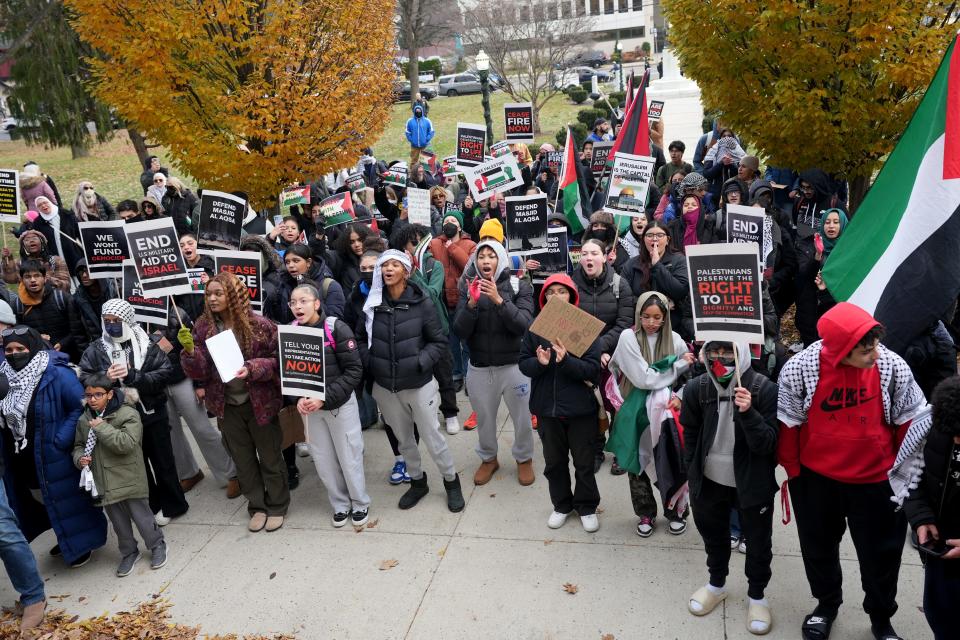
On this day, however, common ground seemed as elusive as that peace in the Middle East.More than 100 students from Teaneck High School had cut class to protest Israel’s invasion of the Gaza Strip and what they claimed to be Israel’s mistreatment of Palestinians.
The students did not mention that Israel’s recent military action was a response to the Palestinian Hamas terror attack of Oct. 7 from the Gaza Strip that left 1,200 people dead in Israel, some 240 taken hostage and dozens of women sexually assaulted. Nor did they say anything about the Hamas attack being the deadliest single-day rampage against Jews since the Nazi Holocaust.
After first rallying at the high school football stadium — near a memorial to African Americans slain under questionable circumstances by police across America — the students marched a half-mile to the Teaneck town hall for more speeches.
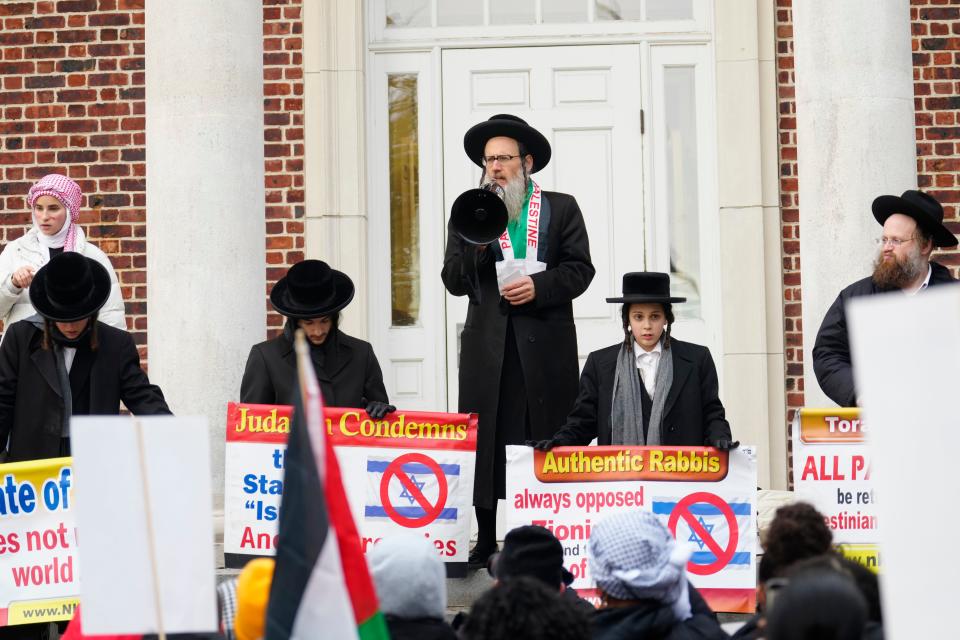
“Free, free, free Palestine,” they chanted again and again.
On a corner, near a public school named after one of Teaneck’s civil rights champions during its landmark school integration of the 1960s, a lone Jewish woman listened. After a half-minute or so, the woman shouted back: “Free the hostages.”
The students did not seem to hear the woman. Or if they did, they didn’t acknowledge her. “Free Palestine,” they kept chanting.
It was as if both sides spoke different languages, from separate communities, talking past each other and unable to comprehend the other’s point of view.
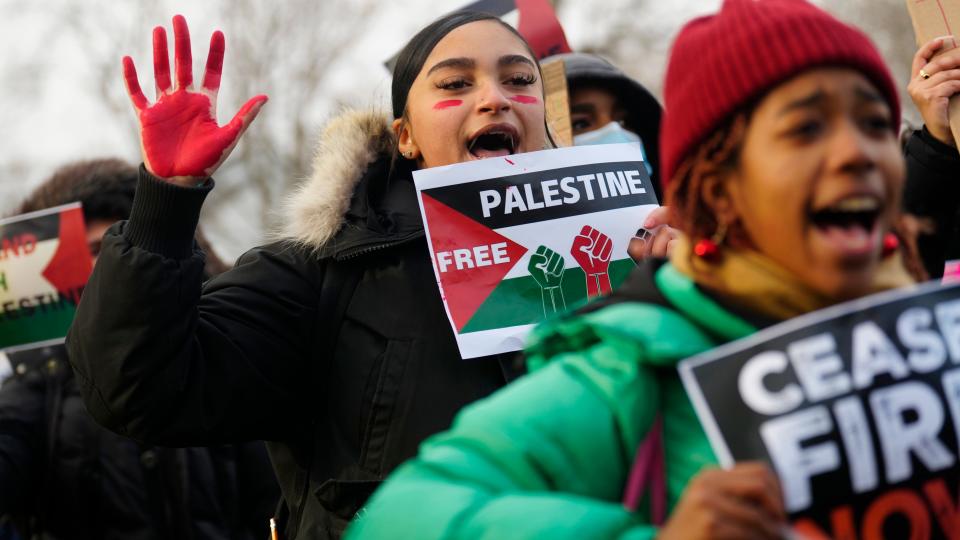
For Teaneck, which promotes itself as welcoming all manner of religions, races and ethnic groups and once had a Muslim mayor and a Jewish deputy mayor, such a scene raises questions that some say challenges the soul of the community. Long touted as a national model of inclusiveness — it was the first U.S. community to voluntarily desegregate its schools through busing in 1965 — Teaneck suddenly finds itself struggling to find the right way to address the Middle East crisis.
During several weeks of interviews, many residents, ranging from religious and political leaders to students, pointed to a suddenly thorny conundrum: How can a town that boasts of finding common ground for its 39,000 residents on all manner of local issues now find the key to respectful discussions of a faraway problem that seems to elude common ground and yet affects so many residents?
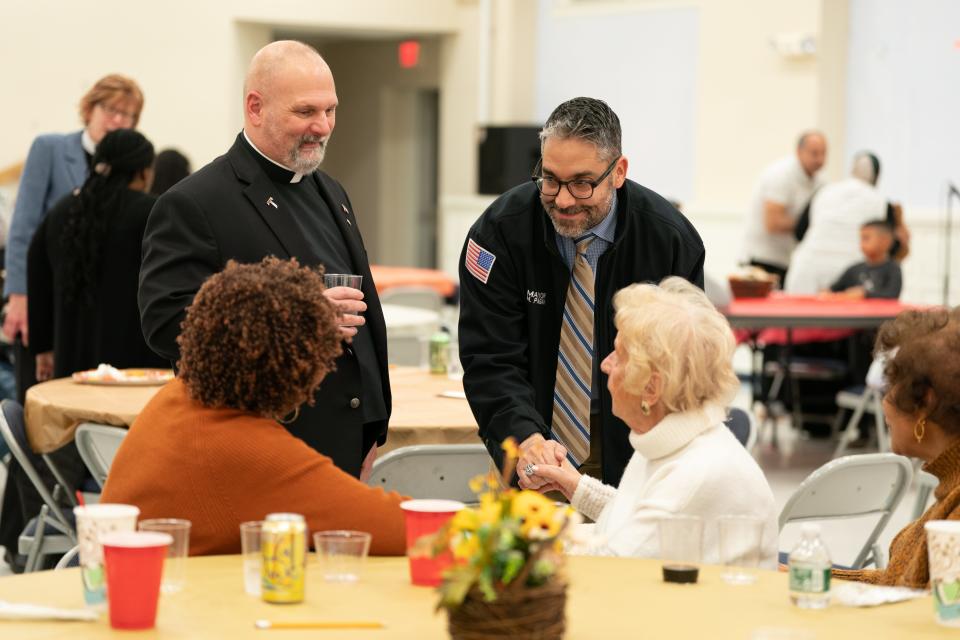
Teaneck’s mayor, Michael Pagan, summed up the sentiments of many, describing the last few months as an especially “difficult and challenging time for Teaneck.”
“Our township historically has gone through numerous difficult times and we always come together,” said Pagan, the town’s first Latino mayor. “I hope that we will again. But this particular moment feels a little more strained. There are a lot of people hurting right now.”
Where is Teaneck's tradition of peaceful dialogue?
Teaneck has faced other troubling periods that tore at its well-constructed social fabric. Many point to several years in the early 1990s, when Teaneck convulsed with raucous protest marches and soul-searching debates in meetings and at dinner tables after a white police officer shot and killed an African American teenager.
Back then, the town relied on its well-honed tradition of peaceful dialogue, as well as a variety of respected leaders ranging from sports coaches to clergy, police and business owners, to hold the town together.
Today, those strong foundations seem frayed, residents say. Many leaders from the 1990s have died or moved away. "The Art Gardners and Manny Landaus are long gone," said Deputy Mayor Elie Katz, referring to Arthur Gardner, a beloved African American high school coach, and Emanuel Landau, a widely respected Orthodox Jewish psychologist, who, as neighbors, joined forces in 1991 to prevent a confrontation between militant Jewish and Black protesters.
"There is divisiveness in Teaneck now and very few community leaders who cross different aisles," Katz said.
As a result some long-standing pillars of civic life in Teaneck, from the police to the school board and various churches and synagogues, find themselves under new stresses, brought on by an ancient conflict thousands of miles away.
Teaneck police confirmed to NorthJersey.com and The Record that they are investigating a series of threats on social media against Muslim students at the local high school who led anti-Israel protests.
More Mike Kelly: At Cornell, how did the debate on the Israel-Hamas war nearly turn violent?
Police Chief Andrew McGurr declined to comment in detail, however, explaining that “we’re dealing with an active investigation and we’re also dealing with juveniles.”
Jewish students at the high school say they fear going to class and wearing a yarmulke or a Star of David necklace that might identify them as Jewish. And each Saturday, police cruisers, officers and private security guards keep watch at synagogues to prevent possible attacks.
As if that’s not worrisome enough, Teaneck officials point to other signs that the Israeli-Palestinian conflict has frayed the town’s tradition of respecting diverse cultures and views.
Jews and Muslims have held several competing protest rallies on the Teaneck Municipal Green, but only with heavy police presence and with long rows of steel fencing erected to keep the groups apart. The rallies have become so common that Teaneck’s town manager, Dean Kazinci, predicts that the town will likely exceed its $650,000 budget for police overtime this year.
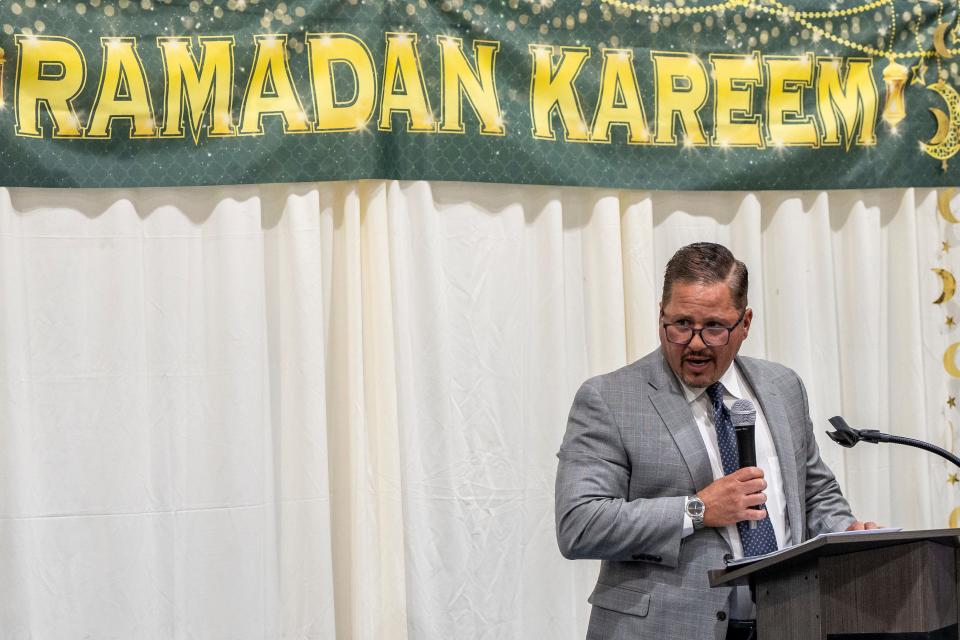
“Sometimes diversity is our best asset. Sometimes it can be our worst asset,” said Kazinci, who grew up in Teaneck and served as a police captain before taking on the township manager’s job.
On Oct. 31 — Halloween — Kazinci, sensing that the town needed to find common ground, reached out to members of the influential Teaneck Clergy Council, asking its Christian, Jewish and Muslim members to sign a general statement condemning hate speech and calling for safety in schools.
The Christian and Jewish members of the council quickly signed. As of this week, Kazinci is still waiting for two Muslim imams to come to his office to sign. Neither imam responded to requests for comment from The Record.
Many homes in the northwest corner of Teaneck — the center of the town’s Orthodox Jewish population — display lawn signs that support Israel and call for the freedom of Hamas-held hostages. By contrast, in Teaneck’s southern and eastern neighborhoods, where three major mosques are located, an entirely opposite message echoes, with many homes displaying “Cease-fire Now” signs — a reference to Israel’s bombing of civilian neighborhoods in the Gaza Strip.
Rare is the home with signs that address both issues — and criticizes both sides.
Israeli supporters say it’s unjust to discuss the long-standing Palestinian conflict in light of the recent Hamas atrocities. Likewise, Palestinian supporters sidestep the bloodshed by Hamas. As with the protest march by Teaneck high school students, the messages pass each other like traffic in opposite directions.
On Cedar Lane, Israeli flags and photos of the Hamas hostages adorn windows in several kosher restaurants. A few blocks away, Richard Siegel, an accomplished jazz pianist and outspoken Jewish advocate of Palestinian rights who often attends pro-Palestinian protest marches, displays a green, black and red Palestinian flag.
Meanwhile, the town council, the local municipal Democratic club and the schools superintendent have all struggled — in some cases, stumbled clumsily — in releasing a series of statements addressing concerns from both sides in the Israeli-Palestinian dispute.
In mid-October, a resolution by the Teaneck Township Council to condemn the Hamas attack without addressing the decades-long history of complaints by Palestinians over Israeli occupation of the Gaza Strip and the West Bank prompted seven of 11 members to resign from the town’s Advisory Board on Community Relations.
It also touched off a loud pro-Palestinian demonstration at town hall.
When the Township Council revisited the issue two weeks later — on the night before Halloween — and passed a “Peace and Unity” resolution that “values the lives of innocent Israeli and Palestinian citizens” and pledged to bring Teaneck together, the effort seemed too late. What passed for respectful dialogue in Teaneck seemed poisoned.
The former Community Relations Board chairman, Yassine Elkaryani, 38, an IT consultant from Morocco who moved to Teaneck 13 years ago, said he quit his post because he felt the town council’s initial resolution condemning only Hamas and not the Israeli occupation “deliberately divided the town.”
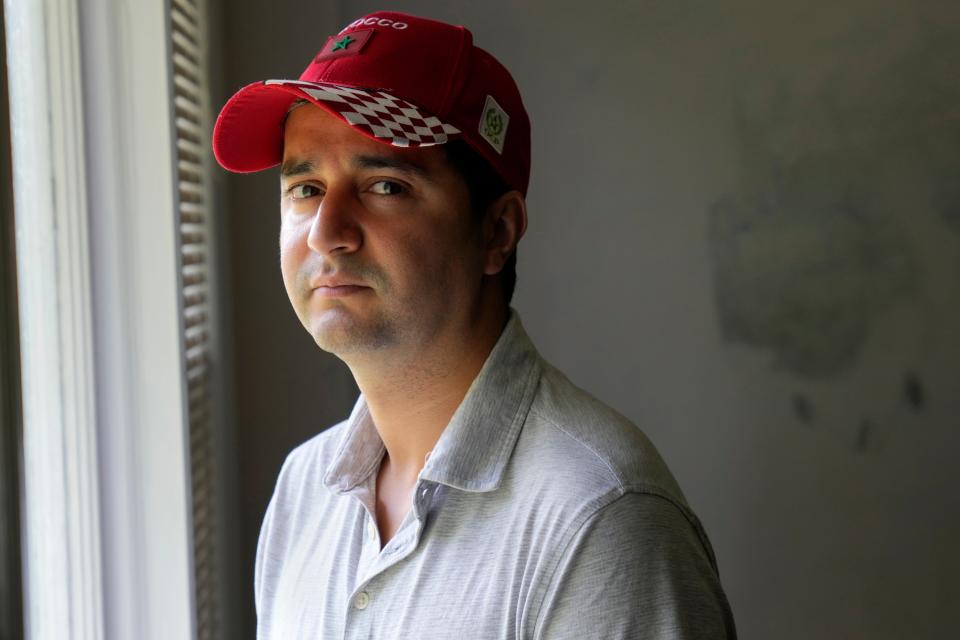
The second resolution, he said, failed to satisfy either side.
To pro-Israel advocates, the new resolution reeked of efforts to excuse the Hamas murders as part of a long-standing grievance against Israeli occupation of the Gaza Strip and the West Bank. To Palestinian supporters, the new resolution seemed watered down and was not strong enough. “It was clear that the town council was being tribal,” Elkaryani said in an interview. “The council is interested in window shopping as opposed to substantial community relations work.”
Nonetheless, Elkaryani said he wished that the Township Council never drafted a resolution that addressed any aspect of the Israeli-Palestinian conflict.
“The council has no business in this issue,” Elkaryani said. “Leave the Middle East in the Middle East. The moment you bring the Middle East conflict into Teaneck it’s going to be devastating. I never signed up to import the Middle East conflict here.”
Teaneck's Jews say they are worried — and afraid
Meanwhile, in interviews, many Jews said they feel suddenly vulnerable, with worrisome reports of rising antisemitism across America, especially at college campuses. Two weeks ago, three Jewish students sued New York University, saying their civil rights had been violated by pro-Palestinian protesters who chanted anti-Israel slogans. Federal authorities are investigating allegations of antisemitism and Islamophobia at Rutgers University and 28 other colleges and school districts. On Tuesday, Rutgers suspended the pro-Palestinian group, Students for Justice in Palestine.
Often, in interviews, Jewish residents pointed to such chants as “free Palestine from the river to the sea” — a staple of many pro-Palestinian rallies — as coded language that calls for the eradication of Israel and is, therefore, antisemitic. Few Palestinian supporters understand the theology and Biblical roots behind such claims by Israel. Or, if they do, they dismiss it.
At the same time, many Jews interviewed said say they feel betrayed by Teaneck’s progressives who they say not only failed to condemn the Hamas massacre in general but specifically the reports of brutal sexual assaults of Israeli women.
“We don’t want to close ranks and say we can only look out for ourselves, but we feel largely alone,” said a Jewish woman who asked that her name not be used because her child attends one of the Teaneck’s public schools and fears being bullied by non-Jewish students.
“Where is the mass condemnation of the women who were raped and children who were then killed?” the woman added.
Muslims in Teaneck say they 'don't really feel safe'
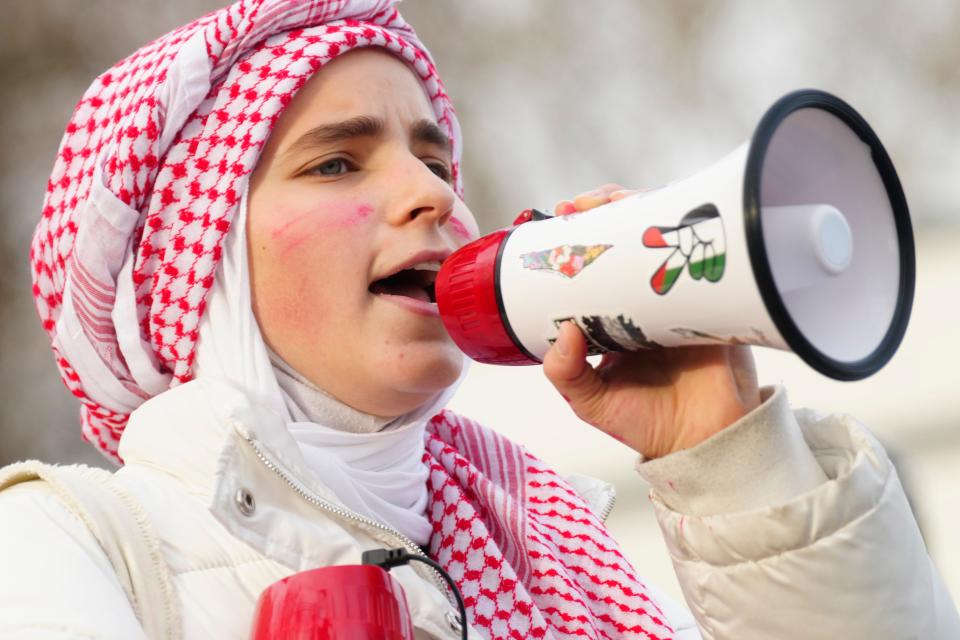
Muslims in Teaneck echo a similar refrain about their own plight.
Hours before she led the walkout of Teaneck High School students, Amar Halak, 17, a senior whose family immigrated from Syria, received a threatening anonymous text message on her cellphone.
“From the river to the sea, you will die a horrible death and burn in hell without any virgins because you support murder, rape and the kidnapping of young children,” the message said.
It was one of 30 threatening texts that Halak said she received. She now assumes that the threats were sent after she included her cellphone number and email address on flyers announcing the walkout. But she’s not sure. And not knowing the source of the threats continues to bother her greatly, she said.
“I don’t really feel safe,” Halak said. “It’s making me real scared.”
The day after the march, as she sat in a business class at the high school, Halak said she received another anonymous text.
“Do you want to get hurt? Just wondering,” the message said.
Halak said that she was so upset that she left the class and found refuge in a school bathroom. From there, she telephoned her mother. She later notified a police officer who is assigned to the high school.
Maryam Marey, 17 and a senior, who, like Halak, is a Muslim and helped to organize the walkout, said she also received anonymous threats.
“It’s very sad to me,” Marey said. “I know these are adults on the other end of the phone. For a grown adult to take time out of the day to send me threats is pathetic. It’s so disappointing. It clear they are not shameful at all.”
Teaneck High walkout spurred pro-Israel gathering — before it happened
On the night before the student walkout from the high school, some 400 residents — most of them Jewish — gathered on the Teaneck town green, citing fears of antisemitism and criticizing what they felt was tacit support by school officials of the students’ protest.
As if following the council’s attempt in October to condemn the Hamas attack and then call for “peace and unity," Teaneck Schools Superintendent Andre Spencer issued several messages that critics cited as confusing and contradictory.
Spencer’s first statement on the march said that “some of our scholars will participate in a peaceful demonstration” and that “it is essential to recognize that our scholars have the First Amendment right to express themselves.” The message was seen by critics as supporting the march.
A day later, 13 Orthodox rabbis, in calling on Jewish residents to gather on the municipal green, issued a statement criticizing the students’ planned protest march as “an overtly antisemitic rally” that conjures up “the blood libels of the Middle Ages.”
“Will the grounds of Teaneck High School ring tomorrow with the truly genocidal chant of 'From the river to the sea'?” the rabbis asked.
Meanwhile, in an apparent response to the rabbis’ concerns, Spencer issued another statement — this time specifically noting that while the town’s school district “respects the scholars’ right to engage in a peaceful demonstration, this does not connote an endorsement of walkouts or messages.”
Spencer also promised that any student who left class to participate in the protest would “receive a zero for missed classwork” and “marked with an unexcused absence.”
“Our teachers will continue to provide engaging lessons,” he added, noting that “consistent with the district’s intolerance of any type of bigotry, including antisemitism or Islamophobia, the demonstration will be peaceful.”
Like the council’s attempt a month earlier to tamp down tensions, critics derided Spencer’s message as too late and too little — certainly not strong enough and laced with language that offered no clear voice.
At the Jewish rally, numerous speakers denounced Spencer. Several called for him to stop the march or resign.
When Spencer did not block the march, Rep. Josh Gottheimer, the Democrat from Wyckoff who represents Teaneck, issued a statement condemning the students’ chants of “from the river to the sea” and chiding the superintendent for “allowing an antisemitic, anti-Israel protest during school hours.”
“Our schools should be free of hate and hate speech, and, I fear that today, Teaneck High School failed in that mission,” Gottheimer said.
What is the school district's perspective?
Spencer did not respond to requests for an in-person or telephone interview with The Record. Instead a school official who handles public relations asked for emailed questions.
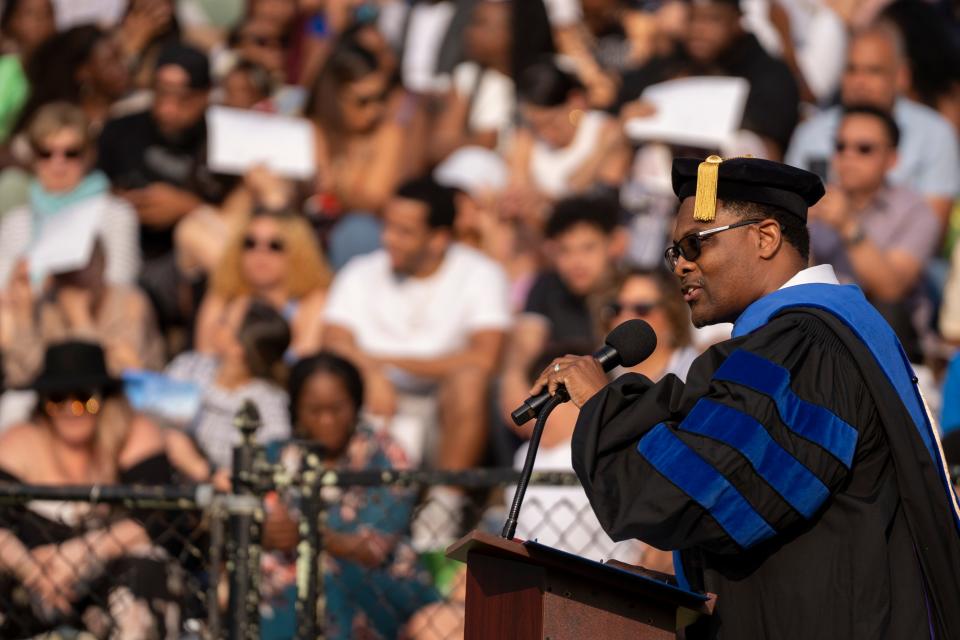
The Record submitted questions addressing 10 topics, including the demand by critics that he resign. Spencer sent back a 249-word response, noting that Teaneck’s schools are a “place for scholarship and diverse viewpoints, all within a framework of safety for scholars, faculty and employees.”
He noted that the student protest had been monitored by school safety officials, who were in touch with police officials. He said the district does not tolerate bullying or harassment. And he added that the district is “implementing sensitivity training programs and are increasing the number of safety officers at the high school” while also “working with student groups and community organizations to provide opportunities for learning and expression in a safe and supportive environment.”
He did not say what those programs might entail. Nor did he address the calls for his resignation or concerns that his passive approach to student protests essentially allowed them the freedom to voice antisemitic sentiments.
A similar debate over the Israeli-Hamas conflict took place within Teaneck’s powerful Democratic municipal committee.
The committee first issued a statement condemning only Hamas. After much internal squabbling — and an hours-long meeting over Zoom among members on a recent evening — the committee drafted a statement that addressed Israel’s treatment of Palestinians.
Once again, the dueling statements left people angry, confused and politically worn out.
“We are a close knit community. Sadly, this was a hard one,” said the Democratic Committee Chairwoman, Alexandra Soriano-Taveras.
“I think we need to take some time to focus on healing in our town and be open to honest dialogue.”
But how to do that?
More Mike Kelly: NYU faces a lawsuit over hate speech. The Israel war opens a new American battle
'Other communities have more space'
From colleges to law firms — even to media organizations — the Israeli-Palestinian war has unearthed all manner of questions about what constitutes fairness, free expression and hate speech. If Teaneck is any mirror for the nation, solutions that lead to improved dialogue and even common ground won’t come easily.
In Teaneck, several notable attempts to find common ground have been tried in recent weeks. Two high school students — a Muslim and a Jew — led efforts to establish a dialogue over the Gaza crisis. Also, the town's Ethical Culture Center, long noted as a place that valued common ground, sponsored a gathering where different viewpoints were shared.
Shuli Sandler, a Teaneck psychologist, found herself counseling many residents who felt emotionally overwhelmed as they followed the news from the Middle East. On a recent evening, she hosted a call-in where residents could voice concerns.
“Because Teaneck is a community with a strong Jewish and Muslim population, I think we’re seeing the direct impact of the Middle East conflict,” Sandler said in an interview after the call-in. “Other communities have more space.”
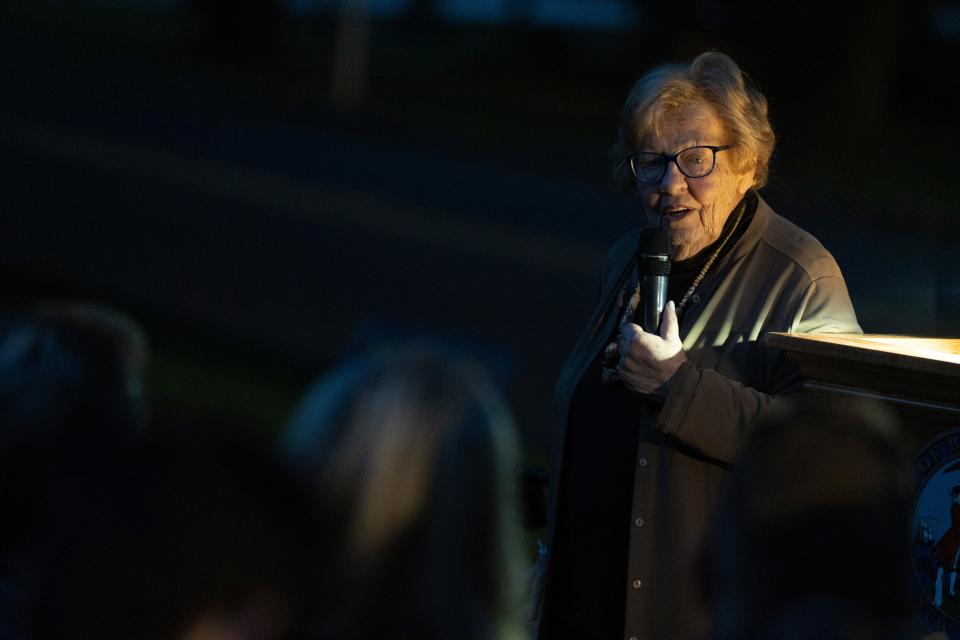
“Is now the time to coexist and give people space or is now the time for dialogue? I don’t know if there is a correct answer,” Sandler said. “For dialogue, you have to find a place of nuance, where people can exist in a shade of gray. Unfortunately there is so much pain right now, we’re not there.”
Loretta Weinberg, 88, a longtime Teaneck resident who retired from the New Jersey state Senate in 2022, is not surprised by Teaneck’s current struggles.
"I fear the town is becoming siloed," Weinberg said. "People are living in their own worlds."
Weinberg got her start in politics nearly a half-century ago as the chairwoman of Teaneck’s Advisory Board on Community Relations. She was elected to the township council in 1990, only weeks after Teaneck Police Officer Gary Spath shot and killed a 16-year-old African American, Phillip Pannell.
The shooting and its legal, political and social aftermath forced Teaneck to reassess its commitment to civil rights and egalitarianism that had its roots decades before.
In the 1930s, as many real estate contracts in New Jersey suburban towns included clauses that prohibited the sale of homes to "non-Christians," Teaneck welcomed Jews. In the 1950s, the town opened its doors to African Americans. By the 1990s, the town's Muslim population had grown substantially. In the 2000s, Teaneck could point to growing populations of Asians and Latinos.
Few American towns can boast of such diversity. Indeed, one of Teaneck's neighborhoods is now home to a Muslim school, a non-denominational Ethical Culture center, a Jewish Hasidic Chabad House and an evangelical Protestant church with a predominantly Asian congregation. Only a few years ago, that same church had been home to a Syrian Christian congregation that worshipped in the ancient Aramaic language — the same language that Jesus of Nazareth reportedly spoke.
"We are one of the few communities that can boast of having a Mikvah (a Jewish ritual bath) and a mosque," Weinberg said. "We are a unique microcosm of what’s going on in the rest of the world."
Weinberg wonders if Teaneck’s new residents really understand the town's idealistic but sometimes difficult history of diversity.
Now, Weinberg feels the town is again facing another troubling period.
“Time heals,” she said. “But it takes time.”
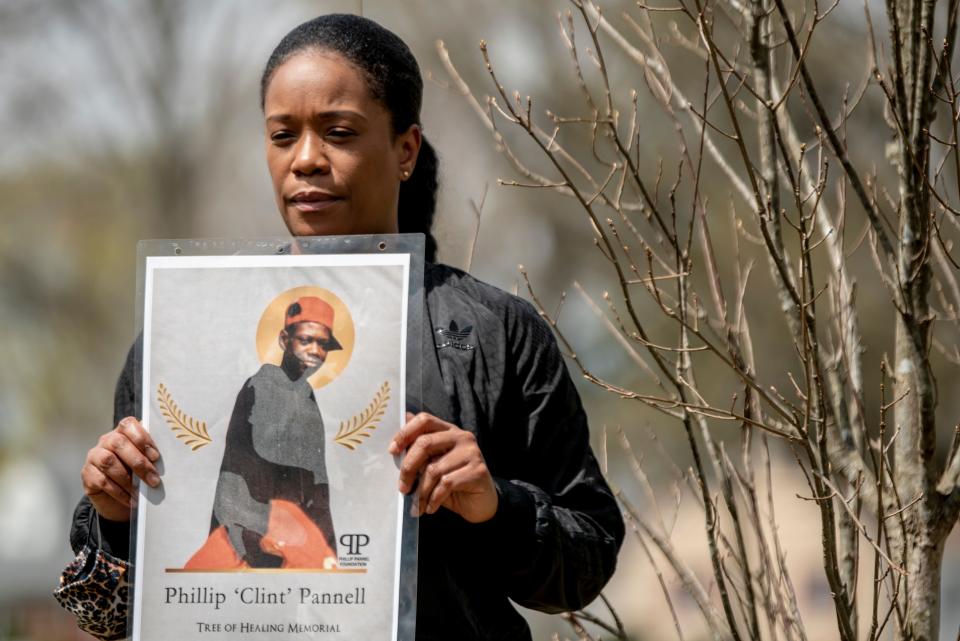
Mike Kelly is an award-winning columnist for NorthJersey.com, part of the USA TODAY Network, as well as the author of three critically acclaimed nonfiction books and a podcast and documentary film producer. To get unlimited access to his insightful thoughts on how we live life in the Northeast, please subscribe or activate your digital account today.
Email: kellym@northjersey.com
This article originally appeared on NorthJersey.com: Israel-Hamas war fuels Teaneck NJ rift. Can it be fixed?

